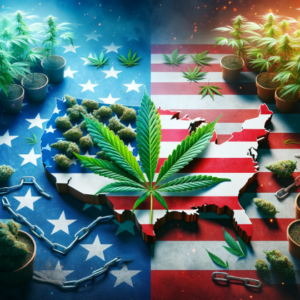
Will Pennsylvania Legalize Recreational Marijuana This Year?
Pennsylvania may be facing recreational legalization on November’s upcoming ballot, and though attempts in recent years have been unsuccessful, shifting attitudes in the GOP-Controlled state senate are giving cannabis advocates reason for hope.
Last month, Democratic Senator Josh Shapiro spoke up in support of a measure to legalize recreational marijuana, presenting a $48.3 billion spending plan based on revenue from legal, adult-use sales. Shapiro’s budget plan proposed an adult use market taxing recreational sales at 20%, which could, according to his projections, bring in approximately $250 million in tax revenue for the state.
Past legalization measures from recent years have also highlighted the benefits that an adult-use market would create for the wider community by means of tax revenue, job creation, socioeconomic equity, consumer safety, and the state’s agricultural industry.
But what is the status of Shapiro’s adult-use legalization effort in Pennsylvania and what are the next steps that lawmakers would need to take to proceed? How could an adult-use market help the state of Pennsylvania, and what would shopping at dispensaries look like if PA transitions from medical-only to adult use? Read on to learn everything you need to know about Pennsylvania’s adult-use legalization prospects for 2024.
2024’s Adult Use Marijuana Legalization Bill
Governor Shapiro’s proposal came late last month, and his multi-billion dollar spending plan presents an appeal for adult-use legalization to increase tax revenue, create jobs, support state agriculture, increase socioeconomic equity, and support consumer safety. The Governor’s new measure is one of many from recent years, and so far, Pennsylvania state lawmakers have failed to advance various, past legalization proposals that remain deadlocked by partisan debates.
Shapiro, however, is determined to follow the progress of “practically all of our neighbor[ing states]” in expanding the state’s medical market to accommodate adult-use sales. Shapiro cited consumer safety and the need to limit black market sales as a key concern:
“Our failure to legalize and regulate this only fuels the [illicit] market and drains much needed resources for law enforcement,” Shapiro said. “It’s time to catch up.”
Shapiro did not offer a specific legalization plan in his budget proposal, focusing instead on financial gains from a proposed 20% tax on all adult use sales.
Past Legalization Attempts in PA & Shifting Senatorial Attitudes
This year’s measure comes on the heels of similar proposals by various lawmakers over recent years, including appeals from Shapiro’s predecessor, Tom Wolf, who voiced his support of legalization in 2019, yet remained unsuccessful even after years of attempts while in-office.
However, the GOP-dominated state Senate has become increasingly lenient and progressive in its approach to cannabis, with several state senators who control key committees speaking out in support of legalization, as well as remarks of support from the lawmakers tasked with setting the chamber’s agenda.
2023’s Laughlin-Street Bipartisan Adult Use Marijuana Legalization Bill
Though Shapiro hasn’t articulated a detailed infrastructure for his proposed adult-use PA market, we might speculate that the proposed program would appear similar to last year’s “Laughlin-Street Bipartisan Adult Use Marijuana Legalization Bill.” The bipartisan measure, proposed in 2023 by Senators Dan Laughlin (R ) and Sharif Street (D ), was introduced as a wide-ranging initiative to harness adult-use sales in the interest of consumer safety and socioeconomic equity:
“The Laughlin-Street Bipartisan Adult Use Marijuana Legalization Bill prioritizes safety, social and economic equity, and engages Pennsylvania’s agricultural industry. Their proposal ensures the vitality of Pennsylvania’s world-class medical marijuana industry while creating thousands of jobs and generating hundreds of millions of dollars in new tax revenue for the Commonwealth.”
The 2023 measure, now deadlocked by partisan divides, sought to legalize the possession and (limited) cultivation of marijuana by adults 21 and older, who would be able to purchase cannabis at licensed PA dispensaries. Last year’s bill proposed a modest tax by comparison to Shapiro’s new initiative, suggesting a state sales tax of 6% combined with a 10% Excise Tax. In addition, the Laughlin-Street bill sought to create revenue opportunities for both industrial and craft farmers, proposing “Micro-Cultivation licenses” to allow small operators to engage in the new industry.
Like various, earlier proposals related to legalization in PA, last year’s Laughlin-Street bill also sought to expunge prior criminal offenses for nonviolent marijuana-based convictions, and to channel tax revenue toward community initiatives. And like many adult-use legislative proposals across the country, the bill also sought to decriminalize the cultivation of up to five plants per household for registered cardholders in PA.
What Would Adult Use Look Like in PA?
If Shapiro’s initiative is passed in 2024, anyone aged 21 and older will be able to purchase recreational marijuana from legal, recreational dispensaries. With the legalization of adult-use cannabis, PA would likely witness the opening of new, specialized recreational dispensaries, while medical dispensaries would remain limited only to registered cardholders. In addition, existing medical dispensaries could expand to accommodate a hybrid clientele, with divisions for both medical and recreational customers in a single store.

Pennsylvania’s Legalization History
The state of Pennsylvania legalized medical marijuana in April 2016, with dispensaries opening their doors to residents across the commonwealth at the beginning of 2018. Under the state’s official medical marijuana program, patients with qualifying physicians who have approved prescriptions for medical marijuana are permitted to shop at licensed medical dispensaries, and to possess limited amounts of marijuana purchased from legitimate dispensary locations.
How Could Legalization Help PA?
Wider Range of Access to Dispensaries & Products for All 21 & Older
If adult use is legalized, the process of shopping at a recreational dispensary in PA would be similar to buying alcohol: anyone aged 21 and older may enter a dispensary and purchase cannabis products by showing a valid photo ID. Though Pennsylvania currently houses medical dispensaries, only individuals licensed and registered through the state’s medical marijuana program are permitted to shop at these locations. If recreational marijuana is legalized, those with their medical cards can still shop at dispensaries with the guidance of experts to find therapeutic products, while non-registered individuals will be able to visit separate (or combined) adult-use shops that make legal cannabis accessible to anyone over the age of 21.
Safe, Vetted Cannabis Products to Deter Black Market Use
By legalizing recreational marijuana, PA could significantly reduce the number of black market purchases involving cannabis products. This is important not only with regard to reducing crime, but also for consumer safety. Whereas cannabis products sold on the black market are not tested for safety or efficacy, and can pose serious harm if adulterated, cannabis sold in medical and recreational dispensaries would be regulated for safety and quality control. Before reaching dispensary shelves, manufacturers and products would undergo stringent testing to ensure that products are properly cultivated and extracted; accurately advertised; and free of solvents, residuals, pesticides, heavy metals, and other common contaminants.
Tax Revenue & Jobs
Shapiro’s estimates project multi-billion dollar gains in tax revenue from a 20% adult use sales tax. This is the highest proposal yet in a long history of bills advocating for adult use based on tax gains: in 2023, the Laughlin-Street measure was projected to generate between $400 million and $1 billion in new tax revenue for the Commonwealth of Pennsylvania. In addition, legalization from Shapiro’s ballot would create thousands of new jobs in the state.
Socioeconomic Equity
If recreational marijuana is legalized, Pennsylvania lawmakers could promote socioeconomic equity by expunging marijuana-based convictions for nonviolent offenders facing prison time or charges. Meanwhile, the decriminalization of marijuana would prevent unnecessary future convictions by legalizing the possession and cultivation of marijuana on a limited scale.
Learn More About Medical Marijuana in PA
Though Pennsylvania has yet to legalize adult-use sales, the state’s medical marijuana program allows registered cardholders with a qualifying condition to purchase safe, legal cannabis products at dispensary locations. Want to learn more about getting your medical card to shop at PA Dispensaries? Fill out this form to get started, and a representative will contact you to schedule an appointment with a licensed physician.







